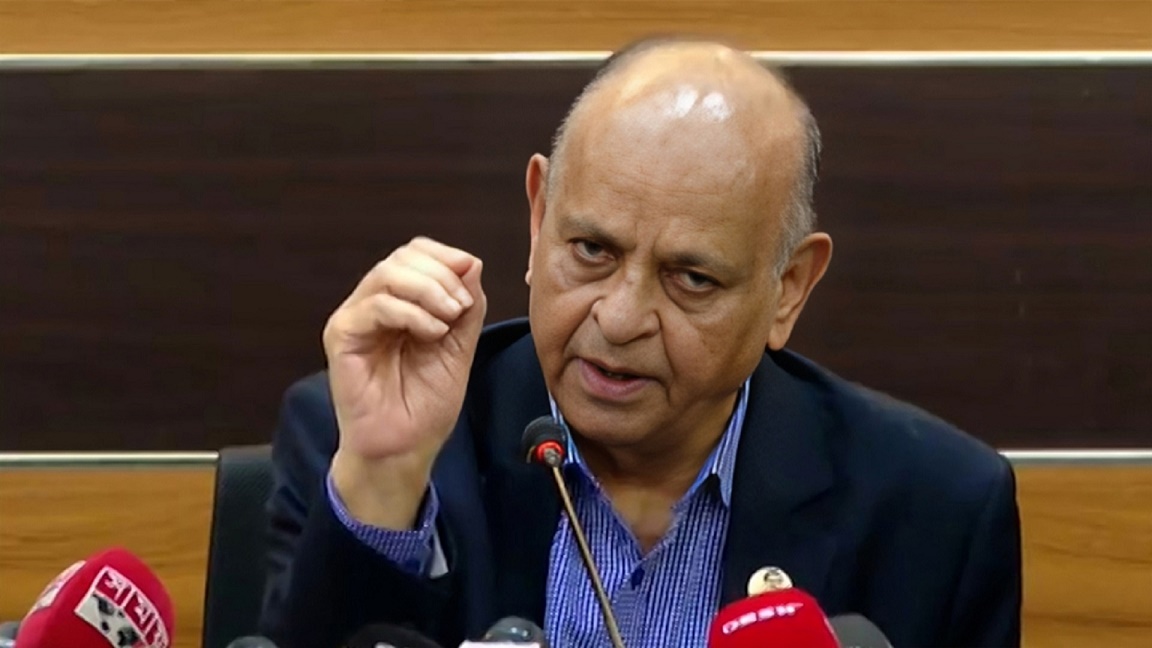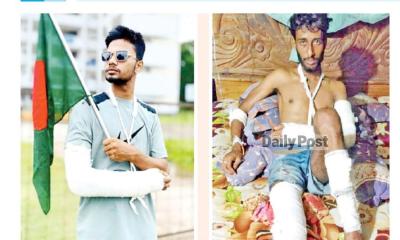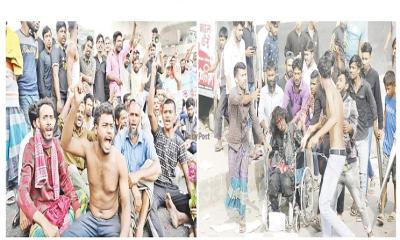- More than 3K illegal hospitals &clinics were closed
- It is my responsibility to protect both the patient and the doctor
Dr Samanta Lal Sen, Health Minister
After independence, the Father of the Nation Bangabandhu Sheikh Mujibur Rahman started the development program of the country by giving priority to the health sector. Bangabandhu said, to build a prosperous country, we have to be a healthy nation. For this purpose, he did not stop giving importance to the health sector; he took comprehensive and timely steps. Bangabandhu took the initiative to establish a 'Burn Institute' to provide services to patients injured in fire accidents.
Samanta Lal Sen, a young doctor of that time, started treating patients injured in fire accidents under the instructions of Bangabandhu who is now the Health and Family Welfare Minister of the present government. Bangabandhu's Burn Institute, which started with only five beds, is now the world's largest 'Sheikh Hasina National Burn and Plastic Surgery Institute' with five hundred beds.
Prime Minister Sheikh Hasina entrusted Professor Dr Samant Lal Sen. He is a name of trust and faith to patients injured in fire accidents at that time. Bangladesh Awami League got absolute victory in the last 12th parliamentary elections. The health sector has undergone a revolutionary change during the AL government, which has been in power for nearly two decades. Prime Minister Sheikh Hasina brought Professor Dr Samanta Lal Sen as a surprise to the new ministerial meeting to implement the vision and mission of her government for universal health services.
One of the most important ministries of the country is the Ministry of Health and Family Welfare. On receiving the responsibility, he said, I never thought I would get such a big responsibility in my life. This responsibility is entrusted to me. He is constantly repaying the Prime Minister's trust through his work. As soon as he got the responsibility, he rushed first, to see the quality of health care at the marginal level. He said that the Prime Minister wants to ensure health services for people of all levels of the country. For this it is necessary to deliver health services at the marginal level. If you have time to increase the quality of service, go to various upazila health complexes. He has also set a precedent of taking disciplinary action immediately upon seeing any incident in the medical care of patients. After taking responsibility to prevent anarchy in the health sector, he ordered an operation against illegal hospitals and clinics in the whole country. More than three thousand hospitals and clinics were closed.
He ordered special units in the hospital to eliminate the shortage of medical services for seasonal diseases like dengue. Special initiative has been taken to attract foreign patients in the hope of better medical services. To increase the quality of medical services in the specialized hospitals of the country, the program of appointment of doctors has been undertaken. He said patients from Bangladesh will not go abroad; they will come to Bangladesh from abroad. "Despite the availability of quality medical services in the country, people go abroad for treatment. Our Prime Minister takes treatment in the country. Doctors of the country are very talented and skilled.
Unexpected incidents happen between patients and doctors while taking medical care at various times. The Health Protection Act has been proposed in the country to properly investigate such incidents and take necessary measures. He is committed to pass the law in parliament. He said it is my duty to see that the patients get proper treatment. Similarly, it is my responsibility to see that doctors also get protection while providing medical services. It is my responsibility to protect both the patient and the doctor. He said the media about the health sector on various occasions that the number of important institutions for public health treatment such as specialized hospitals, district hospitals, upazila hospitals and community clinics increased in the country during the AL government's rule.
At the same time, the scope of work of the health sector has increased. People are getting medical services and medicines at nominal cost in government hospitals. These are the results of the Prime Minister's visionary thinking about the health sector. Accountability has been ensured to ensure transparency in the work of various departments under the Ministry of Health.
Regarding the shortage of skilled manpower in the health sector, he said, "We are a populous country. The number of doctors is less in proportion to the population. We have taken up the process of recruiting doctors. Advanced training of doctors has been arranged. In order to solve the health education crisis, special attention should be given to increase the quality of medical colleges instead of increasing the number.
There is no substitute for research to improve the quality of care. Allocations to research for physicians have been increased. He said about his personal life, he got many opportunities in life to live abroad permanently. But following the instructions of Bangabandhu and to repay the love of the people of the country, he gave his life for the service of people in country. He said almost everyone in my family lives outside the country. Even if I go to see my family members for a day, my mind wanders - when will I return to the country? The cries of burn patients floated before the eyes. I find my family in patients, patients' relatives and doctors.
Samanta Lal Sen was born on November 24, 1949 in Nagura village of Habiganj. Samanta Lal Sen completed his secondary education in 1964 from St Phyllis High School. After that he completed higher secondary from Surendranath College. He passed MBBS from Chittagong Medical College in 1973. In 1980, he obtained the degree of 'Diploma in Specialized Surgery' from Vienna, Austria. Later he received more advanced training in surgery in Germany and England. Dr Samanta Lal Sen started his career in Baniachang, Habiganj in 1975. Later he was transferred to Dhaka and joined Shaheed Suhrawardy Medical College Hospital.
In 1980, he joined in Dhaka Medical College Hospital. A separate unit for burns and plastic surgery was established in 2003. He retired as the founding director of this unit. Later the government appointed him as the Chief Coordinator of the Burn and Plastic Surgery Unit of Dhaka Medical College Hospital. Later this unit was converted into an independent institute named Sheikh Hasina National Institute of Burn and Plastic Surgery and started providing medical services from here on July 4, 2019. Since its inception, he has been serving as the chief coordinator of Sheikh Hasina National Institute of Burn and Plastic Surgery. Bangla Academy awarded him an honorary fellowship in 2018 for his special contribution to medical care. He is also serving as the President of Bangladesh Plastic Surgeon Society.
ZH






